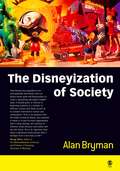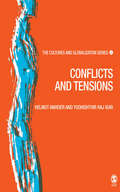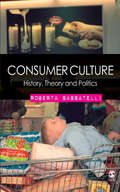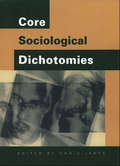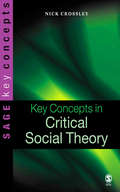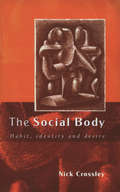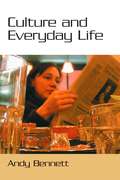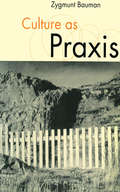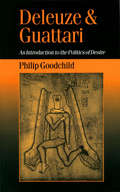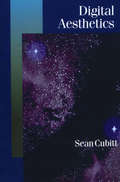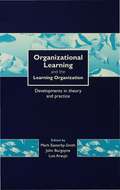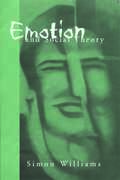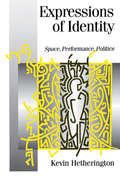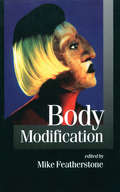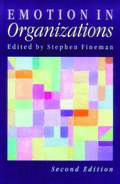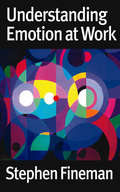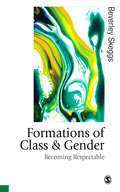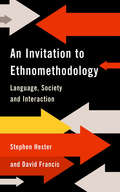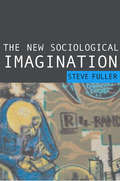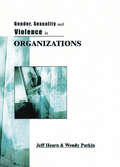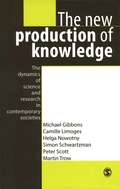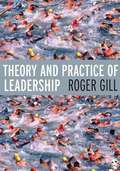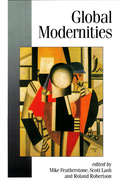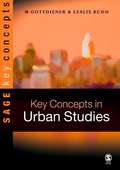- Table View
- List View
The Disneyization of Society
by Alan Bryman`Alan Bryman has expanded on his internationally well-known work on Disney theme parks and Disneyization to create a fascinating and highly readable book. It should prove of interest to beginning students in a number of different courses and fields, as well as to scholars interested in culture and consumption. There is no question that the model created by Disney, and emulated in whole or in part by many organizations and in many settings, will continue to influence social structure and culture well into the future. This is an important book about a significant social process. And, it manages to be a fun read, as well!′ - George Ritzer, author of McDonaldization and Professor of Sociology, University of Maryland `Bryman′s analysis of contemporay consumption is full of detail and provides a host of examples ranging from restaurants and hotels, to theme parks, zoos and sports stadia. Without doubt students will find it an accessible text, one that should allow them to think about consumption, familiar consumer products, settings and activities, sociologically′ - Barry Smart, Professor of Sociology, University of Portsmouth `Bryman′s dissection of Disneyization is a timely and significant contribution to the growing literature on Disney. In fact, his excellent analysis of the extension of Disneyization throughout society explains why we should care about the Disney phenomenon at all. This is not only an important book for Disney scholars, but for any one interested in the future of modern society′ - Janet Wasko Professor of Communication Studies, University of Oregon This is an agenda-setting new work in the sociology of culture and modern society. It argues that the contemporary world is increasingly converging towards the characteristics of the Disney theme parks. This process of convergence is revealed in: the growing influence of themed environments in settings like restaurants, shops, hotels, tourism and zoos; the growing trend towards social environments that are driven by combinations of forms of consumption: shopping, eating out, gambling, visiting the cinema, watching sports; the growth in cachet awarded to brands based on licensed merchandise; and the increased prominence of work that is a performance in which the employees have to display certain emotions and generally convey impressions as though working in a theatrical event. This insightful book demonstrates the importance of control and surveillance in consumer culture. Of interest to a wide variety of students studying in business, sociology, cultural studies, media studies and leisure studies courses this will also be of interest to anybody interested in understanding the intricacies of modern society.
Cultures and Globalization: Conflicts and Tensions (The Cultures and Globalization Series)
by Helmut K. Anheier Yudhishthir Raj IsarThe world's cultures and their forms of creation, presentation, and preservation are deeply affected by globalization in ways that are inadequately documented and understood. The Cultures and Globalization Series is designed to fill this void in our knowledge.<P> Analyzing the relationship between globalization and cultures is the aim of the Series. In each volume, leading experts as well as young scholars will track cultural trends connected to globalization throughout the world, covering issues ranging from the role of cultural difference in politics and governance to the evolution of the cultural economy and the changing patterns of creativity and artistic expression. Each volume will also include an innovative presentation of newly developed 'indicator suites' on cultures and globalization that will be presented in a user-friendly form with a high graphics content to facilitate accessibility and understanding.<P> The inaugural theme is 'Conflicts and Tensions': the cultural dimensions of conflict and the conflictual dimensions of culture. Like so many phenomena linked to globalization, conflicts over and within the cultural realms crystallize great anxieties and illusions, through misplaced assumptions, inadequate concepts, unwarranted simplifications and instrumental readings. The aim here is to marshal evidence from different disciplines and perspectives about the culture, conflict and globalization relationships in conceptually sensitive ways. Thus, in a broad and genuine sense, the Cultures and Globalization Series means not only to promote better understanding of contemporary cultural change but also to serve the cause of peace and security through informed, open and diversified debate.
Consumer Culture: History, Theory and Politics
by Dr Roberta Sassatelli"A thorough and wide-ranging synthetic account of social scientific research on consumption which will set the standard for the second generation of textbooks on cultures of consumption." - Alan Warde, University of Manchester "The multi-disciplinary nature of the book provides new and revealing insights, and Sassatelli conveys brilliantly the heterogeneity and ambivalent nature of consumer identities, consumer practices and consumer cultures... Newcomers to consumer culture will find this an invaluable primer and introducton to the major concepts and ideas, while those familiar with the field will find Sassatelli's sharp analysis and discussion both refreshing and inspiring." - James Skinner, Journal of Sociology "This is a model of what a text book ought to be. Over the past decade the original debates about consumption have been overlaid by a vast amount of detailed research, and it seems unimaginable that a single text couuld do justice to all of these. To do so would involve as much a commitment to depth as to breadth. I was quite astonished at how well Sassatelli succeeds in balancing the two... Ultimately, it's the book that I would trust to help people digest what we now have discovered about consumption and start from a much more mature and reflective foundation to consider what more we might yet do." - Daniel Miller, Material World Showing the cultural and institutional processes that have brought the notion of the 'consumer' to life, this book guides the reader on a comprehensive journey through the history of how we have come to understand ourselves as consumers in a consumer society and reveals the profound ambiguities and ambivalences inherent within. While rooted in sociology, Sassatelli draws on the traditions of history, anthropology, geography and economics to provide: a history of the rise of consumer culture around the world a richly illustrated analysis of theory from neo-classical economics, to critical theory, to theories of practice and ritual de-commoditization a compelling discussion of the politics underlying our consumption practices. An exemplary introduction to the history and theory of consumer culture, this book provides nuanced answers to some of the most central questions of our time.
Core Sociological Dichotomies (Social Theory Ser.)
by Chris JenksIn this sociology text the contributors provide an introduction to the subject without over-simplifying or `writing-down′ to their audience. The book aims to furnish undergraduates with the knowledge that will help them to understand and practice sociology and also to develop a self-perpetuating sociological imagination to enable them to think through new issues and new problems. It consists of a series of specially commissioned chapters around binary or dichotomous themes. Although many sociologists are critical of dichotomous models of sociological theory and research, the device crops up again and again in the history and practice of the subject. Jenks and his colleagues use the dichotomies to situate students in current sociological arguments and topical debates. For example, by examining contradictory pairs of concepts like structure/agency, local/global, continuity/change, students are introduced to alternative explanations for aspects of human conduct over a whole series of issues.
Key Concepts in Critical Social Theory (SAGE Key Concepts series)
by Nick Crossley'Clear and accessible - Key Concepts in Critical Social Theory makes difficult ideas available to an undergraduate audience' -Larry Ray, Professor of Sociology, University of Kent The SAGE Key Concepts series provides students with accessible and authoritative knowledge of the essential topics in a variety of disciplines. Cross-referenced throughout, the format encourages critical evaluation through understanding. Written by experienced and respected academics, the books are indispensable study aids and guides to comprehension. Key Concepts in Critical Social Theory: * Provides brief accounts of the central ideas behind the key concepts of critical social theory * Prepares students to tackle primary texts and/or gives them a point of reference when they find themselves stuck * Discusses each concept in an introductory way * Offers further reading guidance for independent learning * Is essential reading for undergraduates in sociology and across the social sciences. Providing brief accounts of the central ideas behind the key concepts of critical social theory, this book prepares students to tackle primary texts and/or gives them a point of reference when they find themselves stuck. Each concept is discussed in an introductory manner. The book offers further reading guidance for independent learning.
The Social Body: Habit, Identity and Desire
by Nick CrossleyThis book explores both the embodied nature of social life and the social nature of human bodily life. It provides an accessible review of the contemporary social science debates on the body, and develops a coherent new perspective. Nick Crossley critically reviews the literature on mind and body, and also on the body and society. He draws on theoretical insights from the work of Gilbert Ryle, Maurice Merleau-Ponty, George Herbert Mead and Pierre Bourdieu, and shows how the work of these writers overlaps in interesting and important ways which, when combined, provide the basis for a persuasive and robust account of human embodiment. The Social Body provides a timely review of the theoretical approaches to the sociology of the body. It offers new insights, and a coherent new perspective on the body.
Culture and Everyday Life
by Andy Bennett'Bennett provides a well organized, very readable and interesting discussion of a number of significant everyday cultural forms and I am confident student readers will find the book very valuable' - Barry Smart, University of Portsmouth Culture and Everyday Life provides students with a comprehensive overview of theoretical models, issues and examples of contemporary cultural practice. Bennett begins by summarising and situating - in everyday settings - the key theoretical models applied in the study of existing cultural practices. This entails a systematic study of how academic thinking about mass culture has changed, from critical accounts of early mass cultural theorists to radical postmodernist critiques of mass cultural accounts and to 'the cultural turn', which explored how various social identities are culturally constructed. Following this are themed chapters that cover a particular aspect of late modern culture, such as media, music, fashion, tourism and counter-cultural ideologies and movements. In each case a comprehensive literature review is provided and its theoretical and empirical relevance to our understanding of the relationship between culture and everyday life in contemporary society is explained. Lucid, meticulous and illustrated with a host of examples, this is a superb text for teaching and research in the Sociology of Culture and Cultural Studies.
Culture as Praxis (Published in association with Theory, Culture & Society)
by Zygmunt BaumanIn this major work, Zygmunt Bauman seeks to classify the meanings of culture. He distinguishes between culture as a concept, culture as a structure and culture as praxis and analyzes the different ways in which culture has been used in each of these settings. For Bauman, culture is a living, changing aspect of human interaction which must be understood and studied as a universal of human life. At the heart of his approach is the proposition that culture is inherently ambivalent. With a major new introduction to this new edition, this classic work emerges as a crucial link in the development of Bauman's thought. By his own admission, it was the first of his books to grope towards a new kind of social theory, in contrast to the false certainties and gross theorems that dominated much of the post-war period. This is Bauman at his best, at his most subtle and his most searching.
Understanding Stuart Hall
by Helen Davis'This is the most lucid and engaged account of Stuart Hall's work. Meticulously, and with an exemplary generosity, Helen Davis patiently unravels the threads of Hall's intellectual history. The result is a most useful and thoughtful book, which could prove to be indispensable for students of cultural studies' - Graeme Turner, University of Queensland Understanding Stuart Hall traces the development of one of the most influential and respected figures within cultural studies. Focusing on Stuart Hall's writings over a period of nearly fifty years, this volume offers students and academics a cogent and exploratory route through complex and overlapping areas of analysis. In her critical assessment of Hall's most important contributions to academic and public debate, Davis shows the extent to which his analyses of race and ethnicity have been informed by early studies of Marxism, class and 'societies structured in dominance'. Davis offers fresh insight into the formation of one of the most prolific, charismatic and controversial intellectuals of his generation. Despite having been branded a 'cultural pessimist', Stuart Hall has long been associated with encouraging new, cutting-edge scholarship within the field. This volume concludes with a discussion of Hall's most recent political and academic interventions and his continuing commitment to innovation within the visual arts.
Deleuze and Guattari: An Introduction to the Politics of Desire (Published in association with Theory, Culture & Society #44)
by Dr Philip GoodchildThis accessible book examines critically the writings of Deleuze and Guattari, clarifying the ideas of these two notoriously difficult thinkers without over-simplifying them. Divided into three sections - Knowledge, Power, and Liberation of Desire - the book provides a systematic account of the intellectual context as well as an exhaustive analysis of the key themes informing Deleuze and Guattari's work. It provides the framework for reading the important and influential study Capitalism and Schizophrenia and, with the needs of students in mind, explains the key concepts in Deleuze and Guattari's discussion of philosophy, art and politics. Definitive and incisive, the book will be invaluable in situating the philosophy of these two major figures within the perspective of the social and human sciences.
Digital Aesthetics (Published in association with Theory, Culture & Society)
by Sean CubittThis book investigates the aesthetic nature and purpose of computer culture in the contemporary world. It casts a cool eye on the claims of cybertopians, tracing the globalization of the new medium and enquiring into its effects on subjectivity and sociality. Drawing on historical scholarship, philosophical aesthetics, and the literature of cyberculture, the author argues for a genuine democracy beyond the limitations of the free market and the global corporation. Digital arts are identified as having a vital part to play in this process. Written in a balanced and penetrating style, the book both conveniently summarizes a huge literature and sets a new agenda for research and theory. Copyright © Libri GmbH. All rights reserved.
Organizational Learning and the Learning Organization: Developments in Theory and Practice
by Mark Easterby-Smith Luis Araujo John G Burgoyne`The introduction chaper by Mark Easterby-Smith and Luis Araujo introduces the reader to the unresolved issues with which the field is still grappling today.... All in all, this is an interesting and useful book for both researcher and manager alike. First, and perhaps most importantly, the book incorporates multiple perspectives on learning - the psychological, sociological and the philosophical... Second, the book is neither purely theory driven, nor purely empirically driven. Theoretical contributions are complemented by empirical studies which help to illustrate the application of the theoretical contructs. I suspect that this would be of immense value to the practicing manager. Finally, the book provides a critical commentary on the state of the field in a nice compact way which should enhance its value to scholars in this area... a book which is both useful and interesting' - Organisational Studies `[M]ost importantly, the book incorporates multiple perspectives on learning - the psychological, sociological and the philosohical... provides a critical commentary on the state of the field in a nice, compact way which should enhance its value to scholars' - Organization Studies `A valuable resource for academics and practitioners in management and corporate strategy, as well as those involved in mangement training and development' - European Foundation for Management Development `This is a particularly interesting and useful work because it combines some chapters which deal primarily in concepts or indeed theories, and others which describe the experiences of trying to carry out the practices involved in creating both/either organisational learning and/or the learning organisation' -Industrial and Commercial Training 'The editors' overall assessment is that there has been insufficient dialogue between the two camps of action research and theorizing.... As a contribution to mapping this divided house, the text is an apt illustration of these problems. The editor's overview is of interest...' - Stephen Gibb, University of Strathclyde, MCB University Press The debates surrounding concepts of `organizational learning' and the `learning organization' receive a welcome synthezis in this book. International experts explore the links between the two fields of enquiry, which hitherto, despite their intersecting concerns, have represented separate constituencies, literatures and perspectives. The book provides a much-needed integrated framework of concepts and theories which draws on current insights from management cognition, theories of knowledge and learning, management practice and work psychology.
Emotion and Social Theory (Ir) Rational: Corporeal Reflections on the (Ir) Rational
by Prof Simon Johnson WilliamsThe emotions have traditionally been marginalized in mainstream social theory. This book demonstrates the problems that this has caused and charts the resurgence of emotions in social theory today. Drawing on a wide variety of sources, both classical and contemporary, Simon Williams treats the emotions as a universal feature of human life and our embodied relationship to the world. He reflects and comments upon the turn towards the body and intimacy in social theory, and explains what is important in current thinking about emotions. In his doing so, readers are provided with a critical assessment of various positions within the field, including the strengths and weaknesses of poststructuralism and postmodernism for examining the emotions in social life.
Expressions of Identity: Space, Performance, Politics (Published in association with Theory, Culture & Society)
by Kevin HetheringtonThis innovative book sets out to question what we understand by the term `new social movements'. By examining a range of issues associated with identity politics and alternative lifestyles, the author challenges those who treat new social movements as instances of wider social change while often ignoring their more `local' and `dispersed' importance. This book questions what it means to adopt an identity that is organised around issues of expressivism - and offers a series of non-reductionist ways of looking at identity politics. Hetherington analyzes expressive identities through issues of performance, spaces of identity and `the occasion'. This important work shows how the significance of identity politics are at once local, plural, situated and topologically complex.
Body Modification (Published in association with Theory, Culture & Society)
by Mike FeatherstoneThis fascinating collection explores the growing range of body modification practices such as piercing, tattooing, branding, cutting and inserting implants, which have sprung up recently in the West. It asks whether this implies that we are returning to traditional tribal practices of inscribing identities onto bodies on the part of ′modern primitives′, or is body modification better understood as purely cosmetic and decorative with body markings merely temporary signs of transferable loyalties?
Emotion in Organizations (Second Edition)
by Stephen FinemanThis Second Edition contains key themes with all new contributors and is a completely separate work from the first. Emotion in Organization presents original work from leading scholars in the field, they engage with emotion as a qualitative phenomenon which shapes and is shaped by organizational life. Examining how emotion cannot be simply separated from thinking, judgment, decision-making and other so-called rational organizational processes, the book challenges us to build a passionate theory of organizations. <p><p> The introduction reviews the expansion of organizational emotion studies and their appeal to several social-scientific disciplines. Divided into four parts, the book reveals through stories, interviews, confessions, ethnographies and observations the way feeling and emotion lie at the heart of organizational functioning.
Understanding Emotion at Work: Sias, Organizing Relationships + Fineman, Understanding Emotion At Work
by Stephen Fineman`Most folks in organizations dichotomize reason and emotion, often treating emotion as an uncommon or marginal occurrence. Written in a clear and lively style, Steve Fineman's book, Understanding Emotion at Work, dispels this notion as he demonstrates how emotions infuse most practices in organizational life, including leading, decision making, organizational change, gender relations, stress, and downsizing. Sprinkled with vivid examples, Fineman captures the positive benefits of emotions at work as well as the darker side of feelings and despair. Scholars, students and practitioners alike will glean important insights from the lens of emotion that Fineman brings to the subtleties of organizational life' - Linda L Putnam, Texas A&M University `Stephen Fineman has written a wise and engaging text about emotions and how they play out in and around organizations. He underscores, with a range of fine examples, thoughtful commentary and careful scholarship, the essential role of emotions in organizational life. He applies his lens to such issues as recruitment, leadership, decision making and change. He extends the reach of emotions into the virtual world of work and he makes apparent the heavy costs to people and their organizations of toxic emotions that stem from bullying,harassment and downsizing. A must-read in any curriculum dealing with the study of organization' - Peter Frost, Edgar F. Kaiser Professor of Organizational Behaviour, Faculty of Commerce and Business Administration, University of British Columbia, Canada Author of Toxic Emotions at Work HBS Press 2003 `Going to work can be a great joy, a great pain, or a mixture of the two. This clearly written, engaging and authoritative book demonstrates the vital necessity of understanding how emotions permeate work organisations at every level and in every situation. No student of work and its organisation can afford to neglect this important area of study. And no writer on work and organisation is better placed to go to the heart of these matters than Stephen Fineman' - Professor Tony J Watson, Professor of Organisational and Managerial Behaviour, Nottingham Business School `In this book, Professor Stephen Fineman has done more of what he does best writing eloquently and perceptively about emotions in organizations. In this case, he is writing directly for students, both undergraduates and postgraduates, and uses a wide range of disciplinary insights to show how emotions are inextricably embedded in organizational life. His book helps to launch students on a voyage of self-discovery to learn for themselves how emotions impact upon them and their colleagues. As someone who has long challenged the "emotion-less" view of emotion that characterizes much of the research on this phenomenon, he uses his considerable skills to convey the importance, richness and nuance of emotion. Nor does he shrink away from tackling the darker side of organizational emotional life challenging students to reflect on the agony, as well as the ecstasy, that passionate emotions can cause. This book is a valuable resource for teachers wanting to introduce students to organizations, and a fascinating and astute aid for students interested in learning about them - Professor Cynthia Hardy, Department of Management, University of Melbourne `Organizational life is shot through with emotions, spawning a growing interest in topics ranging from emotional intelligence to violence at work. Stephen Fineman provides a much-needed survey of these topics, capturing their sprawling breadth without sacrificing depth. Moreover, he succeeds in conveying the everyday feel of emotions in organizational life in a way that is both engaging and informative' - Blake Ashforth, Jerry and Mary Ann Chapman Professor of Business, W P Carey School of Business, Arizona State University Understanding Emotion at Work gets to the heart of what binds and breaks organizations: emotion. It explores beyond the surface of work to the rich emotional life bubbling underneath, showing what employees and managers constantly ...
Formations of Class & Gender: Becoming Respectable (Published in association with Theory, Culture & Society #51)
by Beverly SkeggsExplanations of how identities are constructed are fundamental to contemporary debates in feminism and in cultural and social theory. Formations of Class & Gender demonstrates why class should be featured more prominently in theoretical accounts of gender, identity and power. Beverley Skeggs identifies the neglect of class, and shows how class and gender must be fused together to produce an accurate representation of power relations in modern society. The book questions how theoretical frameworks are generated for understanding how women live and produce themselves through social and cultural relations. It uses detailed ethnographic research to explain how `real' women inhabit and occupy the social and cultural positions of class, femininity and sexuality. As a critical examination of cultural representation - informed by recent feminist theory and the work of Pierre Bourdieu - the book is an articulate demonstration of how to translate theory into practice.
An Invitation to Ethnomethodology: Language, Society and Interaction
by David J. Francis Stephen HesterThis book offers a new and rigorous approach to observational sociology that is grounded in ethnomethodology and conversation analysis. Throughout the authors encourage the reader to explore the social world at first hand, beginning with the immediate family context and then moving out into the public realm and organizational life. Examples of observational analysis are given with reference to topic areas such as family life, education, medicine, crime and deviance, and the reader is shown how to conduct their own inquiries, using methods and materials that are readily and ordinarily available. Drawing on both original material and published studies, Francis and Hester demonstrate how observational sociology can be carried out with an attention to detail typically overlooked by more traditional ethonographic approaches.
The New Sociological Imagination
by Steve FullerC. Wright Mills′ classic The Sociological Imagination has inspired generations of students to study Sociology. However, the book is nearly half a century old. What would a book address, aiming to attract and inform students in the 21st century? This is the task that Steve Fuller sets himself in this major new invitation to study Sociology. The book: Critically examines the history of the social sciences to discover what the key contributions of sociology have been and how relevant they remain. Demonstrates how biological and sociological themes have been intertwined from the beginning of both disciplines, from the 19th century to the present day. Covers virtually all of sociology′s classic theorists and themes. Provides a glossary of key thinkers and concepts. This book sets the agenda for imagining sociology in the 21st century and will attract students and professionals alike.
Gender, Sexuality and Violence in Organizations: The Unspoken Forces of Organization Violations
by Jeff Hearn Wendy Parkin`This exceptionally interesting study provides an up-to-date and integrated perspective on organizations, violence, gender and sexuality. It pays particular attention to the power wielded by hierarchies of heterosexual men, and the ways in which this produces violence in different, carefully analyzed forms. This book is a major contribution to the construction of sociological and political knowledge that is not founded on the dominant definitions of heterosexual masculinities' - Professor Terrell Carver, University of Bristol `This is a wide-ranging and authoritative book. The authors draw attention to the huge amount of evidence now available that documents the gendering and sexualising processes at the core of organisational life. While they never nag about violation and inequality, they are nonetheless relentless in confronting the reader with the weight of evidence'- Professor Rosemary Pringle, University of Southampton This book brings together the themes of gender, sexuality, violence and organizations. The authors synthesize the literature and research which has been done in these fields and provide a coherent framework for understanding the interrelationship between these concepts. The importance of violence and abuse, and particularly men's violence to women, children and other men has been well established, especially through feminist and some pro-feminist research. The insights of this scholarship have rarely been applied to organizational analysis. The authors draw on this literature and their own research, as well as relevant literatures on safety and risk at work; anxiety and stress at work; organizational policies on violence; sexual harassment and bullying in organizations; and male sexuality, to provide valuable information on violence in and around organizations. Gender, Sexuality and Violence in Organizations breaks new ground in organization studies and will be essential reading for academics and students in both organization studies and all those studying issues of gender and sexuality in organizations.
The New Production of Knowledge: The Dynamics of Science and Research in Contemporary Societies
by Helga Nowotny Peter Scott Simon Schwartzman Martin Trow Michael Gibbons Camille LimogesIn this provocative and broad-ranging work, the authors argue that the ways in which knowledge - scientific, social and cultural - is produced are undergoing fundamental changes at the end of the twentieth century. They claim that these changes mark a distinct shift into a new mode of knowledge production which is replacing or reforming established institutions, disciplines, practices and policies. Identifying features of the new mode of knowledge production - reflexivity, transdisciplinarity, heterogeneity - the authors show how these features connect with the changing role of knowledge in social relations. While the knowledge produced by research and development in science and technology is accorded central concern, the authors also outline the changing dimensions of social scientific and humanities knowledge and the relations between the production of knowledge and its dissemination through education.
Theory and Practice of Leadership
by Roger GillPraise for the first edition: 'At last a well-written, balanced and insightful British book on leadership. It is probable that every theory and assertion of consequence is commented upon. A real tour-de-force. ' - Emeritus Professor Gerry Randell, University of Bradford School of Management 'Theory and Practice of Leadership is an all encompassing, global review of examples and case studies that is both comprehensive and easily adaptable to almost any situation one would encounter in leading people. ' - Richard J. Conwell, Nova Southeastern University, Journal of Applied Management and Entrepreneurship If you are looking for a more holistic and critical take on the field of leadership, look no further! The second edition of this engaging and highly-respected text offers an exploration of leadership in a variety of contexts, both profit-orientated and non-profit. New to this edition: • Refined to capture and delineate the essential theories more clearly, with broader coverage taking in the latest developments in areas such as change, politics, assessment and development of leadership, and multiple intelligences. • Further development of a new integrative model of core leadership themes and practices. • Abundant examples and illustrations, together with detailed explanations of how they apply in practice. • A companion website with an Instructor's Manual, PowerPoint slides, links to additional case studies and full-text journal articles. Theory and Practice of Leadership will prove a highly-stimulating read for undergraduate and postgraduate students of leadership and related subjects as well as management consultants and practising managers.
Global Modernities: Nationalism, Globalization And Modernity (Published in association with Theory, Culture & Society #36)
by Mike Featherstone Roland Robertson Scott M. LashGlobal Modernities is a sustained commentary on the international character of the most microcosmic practices. It demonstrates how the global increasingly informs the regional, so deconstructing ideas like the `nation state' and `national sovereignty'. The spatialization of social theory, hybridization and bio-politics are among the critical issues discussed.
Key Concepts in Urban Studies
by Mark Gottdiener Mr Leslie BuddThe SAGE Key Concepts series provides students with accessible and authoritative knowledge of the essential topics in a variety of disciplines. Cross-referenced throughout, the format encourages critical evaluation through understanding. Written by experienced and respected academics, the books are indispensable study aids and guides to comprehension. Key Concepts in Urban Studies: * Clearly and concisely explains the basic ideas in the interdisciplinary field of urban studies * Offers concise discussions of concepts ranging from community, neighbourhood, and the city to globalization, the New Urbanism, feminine space, and urban problems * Constitutes a re-examination of the key ideas in the field * Is illustrated throughout with international examples * Provides an essential reference guide for all students and teachers across the urban disciplines within sociology, political science, planning and geography.
